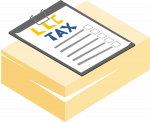Alabama LLC Taxes
By default, Alabama LLCs are taxed as “pass-through entities” and do not pay taxes directly. Instead, the revenue is passed onto the individual LLC members, who report their profits and losses on their individual tax returns. LLC members need to pay the federal self-employment tax, which is 15.3% (12.4% for social security and 4.9% for Medicare). Alabama LLCs are subject to the Alabama Business Privilege Tax, which is $100 minimum. There are other state and local taxes to be aware of, including Alabama state income tax and sales tax.
In this article, we’ll cover:


How Are Alabama LLCs Taxed?
A single-member LLC (SMLLC) is taxed as a sole proprietorship (aka “disregarded entity”) by default. A multi-member LLC is taxed as a partnership by default. Here are the federal tax forms LLCs with default tax status need to file:
- Single-member LLC—Form 1040 (usually Schedule C, but some SMLLCs file C-EZ, E, or F)
- Multi-member LLC—Form 1065
Alternatively, some LLCs in Alabama choose to be taxed as an S-corp or C-corp.
Alabama LLCs taxed as S-corp
An LLC with S-corp status is also taxed as a pass-through entity, meaning the business itself doesn’t pay taxes. However, unlike regular LLCs, S-corps can make distributions to their members that aren’t subject to the 15.3% self-employment tax. To apply for S-corp status, you can file Form 2553 with the IRS.
First, make sure your LLC is eligible to be taxed as an S-corp. S-corps can have a maximum of 100 shareholders, who must be US residents (with a few exceptions). It’s also a good idea to consult a CPA to see if electing S-corp status makes financial sense for your business.
S-corps file IRS Form 1120-S.
LLCs taxed as C-corp
While not common, some LLCs elect to be taxed as C-corps, which is the default tax status for corporations. C-corps are subject to “double taxation,” meaning that the C-corp pays corporate income tax and the shareholders also pay taxes on their individual dividends. However, C-corps are eligible for more tax breaks than regular LLCs, so electing C-corp status can be a smart move for some businesses. We recommend consulting a tax professional before changing how your LLC is taxed.
To elect C-corp status, you’ll file IRS Form 8832. C-corps file their taxes using Form 1120, US Corporation Income Tax Return.

Alabama State Income Tax
Alabama has a graduated personal income tax rate that ranges from 2% to 5%. Below, we show how this tax rate breaks down.
Single persons with adjusted gross income of $4,000 or more:
2% tax on first $500 of income
4% on next $2,500
5% on all over $3,000
Head of family with adjusted gross income of $7,700:
2% tax on first $500 of income
4% on next $2,500
5% on all over $3,000
Married couple filing jointly with adjusted income of $10,500 or more:
2% tax on first $1,000 of income
4% on next $5,000
5% on all over $6,000
LLCs with C-corp status will need to pay Alabama’s corporate income tax, which is a flat 6.5% tax. To learn more about Alabama taxes, visit the Alabama Department of Revenue website.

Alabama Business Privilege Tax
All LLCs in Alabama need to pay an annual business privilege tax. The Alabama Business Privilege Tax rate ranges from $0.25 to $1.75 per $1,000 of net worth, with the minimum tax being $100. You’ll need to pay this tax when filing the AL Business Privilege Tax Return, which is combined with the Alabama Annual Report. The due date is 2.5 months after the beginning of your taxable year. (For calendar year taxpayers, this will be March 15th.)

Sales and Use Tax
As of 2022, these are Alabama’s state sales and use tax rates:
General— 4%
Automotive— 2%
Manufacturing—1.5%
Farm Machinery—1.5%
Vending through Vending Machines—3%
Vending (not machines) Sales & Use— 4%
Amusement Sales & Use—4%
Some municipalities in Alabama impose an additional sales tax, which can bring the total sales tax up to 10% in some counties. Your business will need to register for My Alabama Taxes (MAT) in order to collect this tax from customers.

Local Alabama Taxes
Cities and counties in Alabama can impose their own taxes on businesses, including:
- Sales tax
- Sellers use tax
- Consumers use tax
- Rental tax
- Lodgings tax
Your LLC will need to pay local taxes both in the municipality where your business is based and in any other cities/counties where you do business.

Other Taxes in Alabama
Below are some other Alabama business taxes you should be aware of.
Alabama State Employer Taxes
Most employers in Alabama need to pay unemployment insurance and workers’ compensation taxes:
- Unemployment Insurance (UI) Tax—Employers are taxed on the first $8,000 paid to their employee(s) during the calendar year. You can find out your tax rate on the AL Department of Labor website. The UI tax rate for new employers is 2.7% on the first $8,000 of wages paid to each employee.
- Workers’ Compensation—Alabama businesses with five or more employees are required to purchase workers’ compensation insurance. The insurance rate will depend on your claims history and the amount of risk involved in your employees’ work.
Industry Taxes
There are also state taxes specific to certain industries, including:
- Contractors Gross Receipts Tax
- Dry Cleaning Environmental Response Trust Fund Registration Fee
- Hospital Assessment for Medicaid Tax
- Hydroelectric Kilowatt Hour Tax
- Lodgings Tax
- Mobile Telecommunications Service Tax
- Nursing Facilities Privilege Tax
- Pharmaceutical Provider Tax
- Rental or Leasing Tax
- Telephone and Telegraph Services Tax
- Utility Gross Receipts Tax
- Utility License Tax
- Utility Service Use Tax

Do Foreign LLCs in Alabama Need to Pay Alabama Taxes?
Yes. If you have an Alabama foreign LLC (an LLC formed outside of Alabama that does business there), you’re still required to pay all applicable Alabama taxes, including Alabama Business Privilege Tax and sales and use tax.





